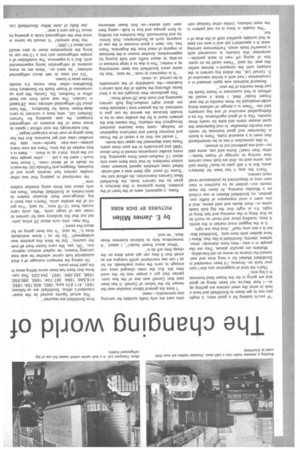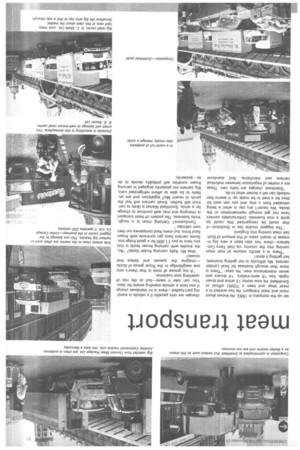• The changing world of meat transport
Page 58

Page 59

If you've noticed an error in this article please click here to report it so we can fix it.
"IF you're looking for a good story, it might pay you to get down to Smithfield and have a look at what the meat carriers are getting up to—I hear they've not been doing so good and are going in for the frozen food business in a big way."
That's the kind of suggestion you don't turn your back on. Anyway, I'd been interested in Smithfield Market for a long time and welcomed the chance to renew an old friendship.
Markets are peculiar places. They are like people in a way—they have character, atmosphere, identity. Smithfield is like that. Many I have spoken with have said, "Smithfield Market is a law unto itself". And they are right.
It is the biggest meat market in the world. A busy, bustling place and never so much so as first thing in the morning and last thing at night, It's at night that the big bulk loads come in—from docks and cold stores. And if you want a vivid impression of traffic congestion, try Smithfield Market at one o'clock on a Monday morning. At dawn the meat moves out—picked up by butchers in their own vans or despatched by professional retail meat carriers.
That's the way it has been for donkey's years. But is it still quite so busy? Some said yes, some said no. And are bulk meat carriers now turning to carriage of frozen foods— other than meat? Some said yes, some said no—and one preferred not to answer.
In this connection it has to be remembered that meat is a seasonal trade. There is boom in December and good business for nearly nine months thereafter. In mid-September the quiet season starts and lasts for nearly three months. This is of great significance. For as a distinguished executive of one big company told me: "There is a danger of vehicles being under-employed for three months of the year. Frozen foods? Well, I think it would be difficult to find customers in frozen foods for just three months of the year."
Seasonal business was again stressed in a conversation I had with a former executive of R. Cornell Ltd., the oldest big carriers in the industry until the company's demise earlier this year. He said: "There could be. no question of laying off men in slack periods— remember this industry is concerned with a powerful trade union. Furthermore carrying meat is a specialist's job and it was not easy to find suitably qualified staff at the drop of a hat.
"The trouble is there is no real pattern in the meat industry. Unlike other haulage veh
ides ours are only really suitable for carrying one commodity—meat.
"I think the general labour situation was the reason for the failure of Cornell. It has been said that Cornell was one of the few companies that got a proper rate for the work they did. But the rates charged were not enough to carry the many overheads. As far as I can see merchants' profit margins are so small that if they can get work done on the cheap they will do it."
"What about frozen foods?", I asked. "A tremendous help to balance business these days," he said.
Rates, it appeared, were at the heart of the problem. Some guidance in this direction is given by the carriers' body, the Smithfield Meat Carriers Association. An official told me: "Some 10 years' ago there was a well-established rates schedule agreed between association members. At that time there were only about 12 medium-sized firms operating. But many smaller companies moved in from about 1960 and particularly in the past three years. These have 'depressed the upper rate levels.
"I would say that as a result of the Prices and Incomes Board and restrictive legislation on haulage, costs have become standard throughout this industry. This means that the present trend is for the smaller man to be in trouble because the service he can give is restricted. At the present time I estimate there are about eight medium /big bulk carriers operating and more than 20 small firms."
This gentleman then brought me to a third factor affecting the health of the bulk carrier's business—the availability of the commodity to be carried, i.e. meat.
"It is important to note," he said, 'that for some years Smithfield has been contracting as a market. This is due to a large increase in ex-ship to depot traffic and bulk buying by supermarkets. Another reason is the decrease in imports of meat from the Argentine. There has, too, been a great increase in the use of outports, such as Southampton, Hull. Grimsby and Avonmouth. Also butchers are tending to form groups and buy in bulk—using their own cold stores so that fewer deliveries from Smithfield are required."
The actual figures quoted by the superintendent's office, Smithfield are as follows: 1961, 411,670 tons; 1962, 405,154; 1963, 418,546; 1964, 387,704; 1965, 365,950; 1966, 362,094; 1967, 364,030. This confirms that there has been some falling away in the past three years.
On asking the transport manager of a third substantial bulk carrier whether he was now carrying frozens, he replied without reservation, "Oh. yes. We carry frozen food all over the country." Did he think this practice was widespread? -So far as I know everybody does it," he said. "It has been going on for about five years."
This man, who runs about 25 ernes, pointed out that the tendency was for carriers to make use of larger units. "My units carry mostly from 12-18 tons," he said, "I've got rid of the smaller units. There's also been a big change-over from drawbar trailers to semi-trailers at Smithfield Market. There are only about two firms using drawbar trailers now."
He mentioned in passing that two other notable carriers had recently gone out of business, Reagans,and Pallrode Ltd. Hewes in no doubt at all about rates: "I know how much I want for a job .. . other people May cut the price, that's up to them ... there is a free market all the time. There are now many pirates—one-man bands—who take the smallest rates and get business. But this has been going on ever since transport began."
Not surprisingly the next official I spoke to knew most of the answers on refrigerated transport. He was speaking for Turners iSoham) Ltd., who have a contract to carry deep-frozen foods for Sainsbury. "We have about 50 refrigerated vehicles, now, 29 based in London. The rest work from our head office in Fordham, Ely, Cambs. We pick up containers of frozen foods for Sainsbury from Blackfriars—other than meats it's mostly frozen peas in boxes.
"It's not easy to talk about refrigerated vehicles," he went on, "there are so many systems of refrigeration being experimented with. But it is expensive. The installation of a simple refrigeration unit into a 12-ton van to bring the temperature down to zero would cost about 1,000."
His final remark? "It should be borne in mind that the refrigerated trade is growing by about 10 per cent a year."
Joe Kelly of John Millar (Smithfield) Ltd. set up the company in 1963. He knows about meat and meat transport. He has worked in a meat shop and been a TGWU official at Smithfield. He now works 13 artics and seven rigids, has 16 semi-trailers, 14 drivers and seven maintenance men. He says: "There is more than enough business for local London carriers. My difficulty is not getting business, but getting it done "There is a terrific volume of Irish meat coming into the country via Irish Ferry Containers—there has also been a very big increase in recent years of the amount of Scottish meat coming into England.
-The biggest trouble lies in Dockland—if that could be reorganized this could be quite a nice business. Unfortunately carriers have not got enough representation at the docks. We haven't any say in what is being unloaded from a ship and you can wait for days for a load to be made up. It seems that nobody can tell a docker what to do.
"Standover charges are fairly rare. These are a matter of negotiation between individual carriers and merchants. And standover charges are only payable if a vehicle is stand ing part-loaded there is no standover charge if you have a vehicle standing empty for days. You can take it away—but at the risk of upsetting your customer.
"A big grouse of mine is that there's only one weighbridge in the Royal group of docks —imagine the queues and delays that causes!
Was Mr. Kelly carrying frozen foods? "No, the trouble with carrying frozen foods is that you have to pay £1,000 for a good fridge box. Some carriers have got contracts with frozen food firms, but many food companies run their own vehicles."
Conclusions? Carrying meat is a tough, tricky business. The pattern of meat transport is changing and may well continue to change for a while. Smithfield Market is likely to contract still further. Small carriers will feel the pinch of recent MoT legislation and are unlikely to be able to afford refrigerated vans. Big carriers not presently engaged in carrying frozen sundries will probably decide to do so—presently.




















































































































